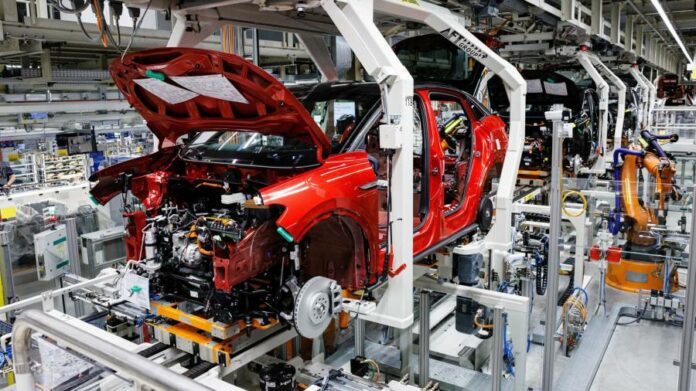Carmakers from the EU have joined UK manufacturers in pushing for a delay to post-Brexit rules that threaten to deliver a severe blow to Britain’s troubled car industry.
From next year, electric vehicles shipped between the UK and the EU will need to have 45 per cent of their parts sourced from within the two regions or face 10 per cent tariffs, under “rules of origin” terms set out in their post-Brexit trading agreement.
With many of the batteries still sourced from Asia, EVs are likely to fall foul of the new threshold and incur the tariff, which Vauxhall and Peugeot owner Stellantis warned on Tuesday might force it to shut its UK plant at Ellesmere Port.
The European Automobile Manufacturers’ Association (Acea) said on Wednesday it was “calling on the European Commission to extend the phase-in period for the rules of origin for batteries beyond January 2024, as the establishment of a fully integrated battery supply chain in Europe is simply not taking off quickly enough to keep in line with more restrictive rules”.
Jaguar Land Rover called the timing “unrealistic and counterproductive”. It added: “We echo the call for the UK and EU to quickly agree a better implementation solution to avoid destabilising the industry’s transition to clean mobility.”
Ford, which makes electric cars in Germany and parts in the UK, said it was “calling for current trade requirements to be extended to 2027, to allow time for the battery supply chain to develop in Europe and meet EV demand”. If implemented as planned, the requirement would add “pointless cost to customers wanting to go green”, Ford said.
“Tariffs will hit both UK- and EU-based manufacturers, so it is vital that the UK and EU come to the table to agree a solution,” it added.
Acea warned that it was “virtually impossible for the electric vehicle to meet its own rule of origin requirement” unless the batteries are bought locally.
It added that the “massive” investments in European battery factories had yet to come to fruition, and that a three-year delay to the new rules would allow more facilities to open.
Although the UK imports more electric cars from Europe than it sells into the market, carmakers in the country have far higher exposure to the EU than rivals in Germany or France have to the UK.
The UK needs to attract battery manufacturers to protect its industry in the electric shift. But homegrown manufacturer Britishvolt collapsed earlier this year and JLR-owner Tata Motors is demanding large amounts of government aid to place a major battery plant in the UK rather than the EU.
At an urgent session in the UK parliament, Labour’s shadow business secretary Jonathan Reynolds said the government needed to “wake up from the steering wheel and get control of the situation before it is far, far too late”.
He added: “It is a statement of the blindingly obvious that the lack of battery-making capacity in the UK, combined with changes to the rules of origin, was a car crash waiting to happen.”
Downing Street said ministers were talking to Brussels about extending the 2024 tariff “cliff edge” for carmakers. “We have raised it with the European Commission. We recognise it’s a problem, not just for us but for them too. We need to find a solution.”
Kemi Badenoch, business secretary, has raised her concerns with Valdis Dombrovskis, EU trade commissioner, with a view to resolving the issue within the framework of the Brexit trade and co-operation agreement.
However, an EU official said Brussels was “not open to changes to the rules of origin”.
“Stakeholders have been given the time to adapt, and they are advised to use the transition time provided,” the official added.
Ministers are also in last-minute talks with Tata in an attempt to persuade the JLR owner to build its EV battery plant in the UK.
Jeremy Hunt, chancellor, on Wednesday said “watch this space” when it came to new EV factories in Britain, a sign that ministers remained hopeful that a deal could be done.
Hunt said: “Everyone is trying to develop the supply of EV batteries, so we need to have that supply here in the UK. The closer it’s located to the factories that are making the rest of the car, the better.”
Officials briefed on the talks said “negotiations are continuing” with Tata, with one adding: “We have a generous package on the table. We are keen to land this major investment for the UK.”
The political and economic stakes are rising, with Labour criticising Prime Minister Rishi Sunak’s government for having “no strategy” to bring to Britain the batteries needed for an electric vehicle revolution.
Senior government figures admit that Tata has given no indication to ministers of their likely final decision.






